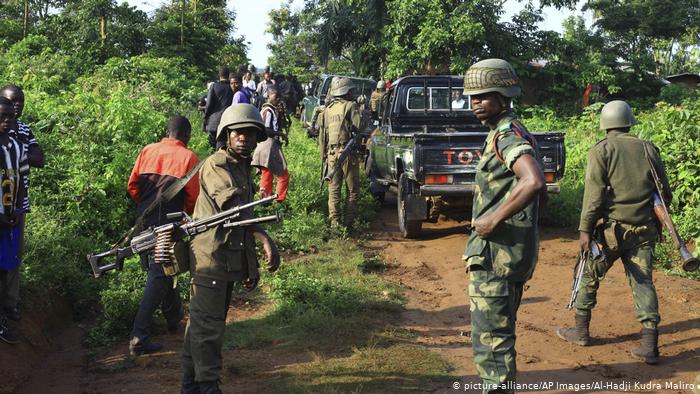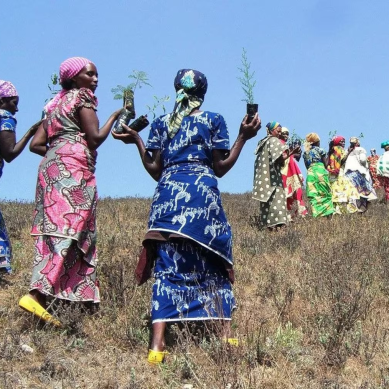
In September last year, during investigations by The New Humanitarian and the Thomson Reuters Foundation in Beni – 60 kilometres northeast of Butembo – the 51 women said dozens of men, mostly foreigners, had coerced them into having sex in exchange for jobs.
The majority of those claims were also against men who said they worked for the World Health Organization (WHO), which initially said the allegations stemming from the investigation were under review internally and encouraged the women involved to contact the WHO.
The following month, the United Nations health agency announced the creation of the independent commission “to swiftly establish the facts, identify and support survivors, ensure that any ongoing abuse has stopped, and hold perpetrators to account.”
WHO spokeswoman Marcia Poole said “appropriate” action would be taken once the commission delivered its findings.
A sweeping report by British lawmakers in January this year found sexual exploitation and abuse was endemic in the aid sector, which they dubbed the “last safe haven” for abusers.
Lawmakers launched the inquiry after being frustrated over the sector’s failure to stem sexual exploitation and abuse in the wake of the 2018 Oxfam sex scandal in Haiti, where its staff were accused of using sex workers, some underage.
In April, Oxfam was back in the news – this time with two senior managers in Congo suspended amid accusations of sexual exploitation, bullying and fraud.
No women in Butembo told reporters they had been abused by Oxfam workers, but the charity said it had confirmed one of the 51 cases reported in Beni last year, which involved a woman who said she was raped by an Oxfam worker.
Oxfam said the man was no longer working for the charity and the woman was being given assistance. The charity said it could not comment further on the separate investigation into allegations against its Congo staff.
“Aid workers knew what was happening,” said one former Oxfam worker, who was part of the Ebola response in Congo and spoke on condition of anonymity. “There were reports made about this behaviour. It was happening everywhere.”
“We are doing everything possible to improve accountability and end sexual exploitation and abuse through strong prevention and response measures, centred on victims and survivors,” said Farhan Haq, deputy spokesman to UN Secretary-General António Guterres.
The latest allegations in Butembo also included a rape claim. One woman said she thought she was going for a job interview. Instead, she said she was raped in a hotel room by a Cameroonian man who said he worked for the WHO.
In 2019, the mother of four was told by a friend working for the WHO that her supervisor was looking to hire a new cleaner. There was one condition, said the friend: “No matter what he tells you, just agree.”
The two women went to the man’s hotel room. After a brief introduction, the friend took a phone call and abruptly left the room. The man quickly came to the point, the 32-year-old woman said: Have sex with him and she could have a job. She said she tried to leave, but the man blocked her.
“He pushed me onto the bed, forced himself on top of me and started to take my clothes off. I tried to get out from under him, but he was so strong and he held me there. Then, he violated me,” she said.
“It was devastating. I thought I would come to talk about employment – like a job interview.” Several days later, she said he called to tell her she could start work. “Every day at work it was miserable,” she said. “He was there.”
After a few weeks, she said she began to feel pain and went to a clinic where she tested positive for syphilis. She showed a reporter her lab test results. Her husband still doesn’t know of the alleged rape.
“I still feel guilty about it,” she said.
The WHO said it was unable to respond to the allegation of rape but would refer the information on to the independent commission.
Fourteen women in Butembo said that men who identified themselves as workers with the World Health Organization offered them jobs in exchange for sex. Another woman said her sister died in 2019 after paying $300 on the black market for a concoction to end her pregnancy.
She sought an abortion after having sex with a man who said he worked for the WHO and gave her a job as a cleaner.
Desperate for money to provide for her three children – and with a husband who had been away for months in another part of Congo – she agreed to have sex with him and was terrified when she fell pregnant, fearing her husband would soon return. She thought the abortion would have allowed her to keep the secret from her husband and children.
“If it weren’t for this Ebola response, my sister would still be alive and fighting for her children,” said the 37-year-old woman, whose identity has been withheld to ensure the privacy of the family. The WHO said it was unable to respond to the allegation but would refer the information they were given to the independent commission.
Much of the alleged abuse in Butembo occurred in a handful of hotels used by aid workers. With its green lawns and tropical flowers, Hotel Butembo was a popular haunt for aid workers, who plied women with drinks and coaxed them up to their rooms, four hotel staff said.
The workers spoke on condition of anonymity out of fear of losing their jobs and asked that their positions not be identified, given the small number of staff at Hotel Butembo.
The medical charity Médecins Sans Frontières (MSF) occupied the property at the beginning of the response in 2018, but after unidentified assailants attacked its treatment centre in February 2019, it withdrew and WHO workers moved in.
One hotel worker, who was an employee at the time and has been employed there for three years, told reporters that MSF staff had strictly enforced a ban on outside visitors and a night-time curfew.
“When WHO took over, everything changed,” the worker said. “We would see young women from town constantly entering at the front gate… All the rules were relaxed.”
Another hotel worker described women arriving in marked WHO vehicles, and noted that several women became pregnant.
The WHO noted the claims but said it was not aware of any allegations of misconduct by its staff at Hotel Butembo.
A hotel worker who was an employee at the time and has been employed there for several years said: “What was happening here was plain to see. Anybody living here would’ve known that it was happening. It wasn’t a secret.”
Staff at Hotel Butembo declined to share the owner’s phone number or email. A message with a contact number left by The New Humanitarian and the Thomson Reuters Foundation at the reception desk for the owners went unanswered.
- The New Humanitarian report











